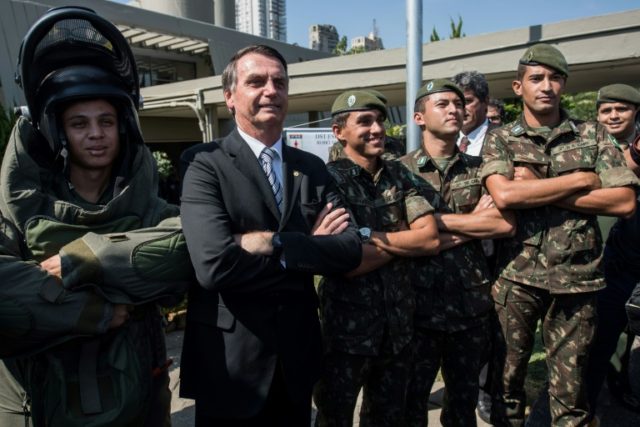Brazil’s House of Representatives will soon feature over double the number of representatives with military experience than it did before Sunday’s election. According to a tally by Folha de Sao Paulo, 22 members of the lower chamber are either veterans or retired military personnel.
Brazil’s UOL outlet counts a total of 72 military veterans between the House of Representatives (Chamber of Deputies), the Senate, and state legislatures.
The dramatic increase in the number of individuals with armed service background now partaking in civil service, and the electorate’s willingness to embrace them, shows rising comfort levels with the military in a nation that spent most of the second half of the 20th century under a coup-installed military dictatorship. It also notably occurs after the biggest military operation in the history of the nation: the 2016 operation to eradicate the Zika virus from the country, which mobilized 220,000 troops.
Folha counts 22 legislators in the House with military backgrounds, including two reserve generals, three colonels, and two captains. Over half of them, 13 members, are representing the conservative Social Liberal Party (PSL). In total, UOL counts 72 veterans legislating in the country, quadruple the previous number.
La Vanguardia reports that many troops were “inspired by issues such as public safety and the fight against corruption,” and that nearly 1,000 troops ran for offices nationwide. The PSL – whose presidential candidate, Jair Bolsonaro, won the first round of elections – is running generally against the policies of the socialist Workers’ Party (PT), which controlled the country from 2003 to 2016. Two years ago, PT President Dilma Rousseff was impeached and removed from office amid millions organizing protests against widespread corruption by leftist politicians.
Among the most high-profile new legislators is Sergio Olímpio Gomes, known commonly as “Major Olímpio,” of the PSL. Olímpio is a newly elected senator from Sao Paulo whose service came about in the police force. A combination of violent crime skyrocketing and significant funding shortcomings in law enforcement have made the revitalization of Brazil’s police a key talking point among conservative candidates. During the 2016 Rio de Janeiro Olympic Games, police complained that the state and federal governments did not provide them enough funding for toilet paper, forcing police stations to ask their neighbors to donate. Some officers took to protesting in Rio’s airport, warning tourists that they did not have the resources to protect them from crime.
Despite the dire need for stronger law enforcement institutions in the country, the general population has long kept the military at arm’s length since the military dictatorship ended in 1985. The military took over the country in 1964, overthrowing leftist President Joao Goulart. Goulart announced a plan to bring Brazil into the orbit of communist countries during the Cold War and expropriate land, as had recently been done in the Cuban Revolution, alarming many centrist and right-wing voices in Brazil’s government. With the support of some of the less radically leftist civilians in Brazilians politics and the United States government, the military took over in April of that year.
The Brazilian military dictatorship instituted a zero-tolerance policy against leftist paramilitaries, left-wing protesters, and anyone generally believed to have communist sympathies. Torture of those detained for ideological crimes was rampant, among its victims Dilma Rousseff. An estimated 500 people were disappeared or killed.
That number stands in contrast to those killed and disappeared in Colombia, where the government has yet to definitively curtail the influence of the Marxist Revolutionary Armed Forces of Colombia (FARC). The over half-century-long struggle against the FARC terrorist group has resulted in 220,000 known deaths, nearly 100,000 disappearances, and up to 5 million internally displaced people, not counting those killed through forced abortions.
The Brazilian military dictatorship also resulted in the phenomenon known as the “Brazilian miracle” of the 1970s. The soldiers running the country handed the economy over to technocrats who imposed strict austerity measures on the country, seeking the support of the International Monetary Fund (IMF) and the United States. The result was a significant reduction in inflation, which had reached up to 100 percent, and a more balanced government budget.
Economists note that the stabilized national economy did not result in prosperity for most of the nation’s poor, and that the military regime did not use its newfound economic position to integrate Brazil’s deep rural areas into the socioeconomic fabric of the nation. Even if they had, most contend that such a reality would not justify the regime’s human rights violations. Those who lived the military coup years express significant reservations about a return of military leaders to political life.
“We used to think about generals all the time. Now we can’t name a single general, but everybody knows the names of the Supreme Court justices,” Fernando Henrique Cardoso, who was president of Brazil from 1995-2003, told El País in September, fearing that this would soon change.
Bolsonaro’s inner circle and supporters appear to disagree. Reserve General Augusto Heleno, one of Bolsonaro’s top advisers, told Brazilian media this week that he was relieved to see the nation trust the military in a way that it had not in years. “This [election] shows that the rancor against the military has decreased,” he claimed. “The history of the military regime was told from only one side, incredibly, from the point of view of the defeated.”
“There is another story, one that will be told one day and provide balance,” Heleno argued.

COMMENTS
Please let us know if you're having issues with commenting.